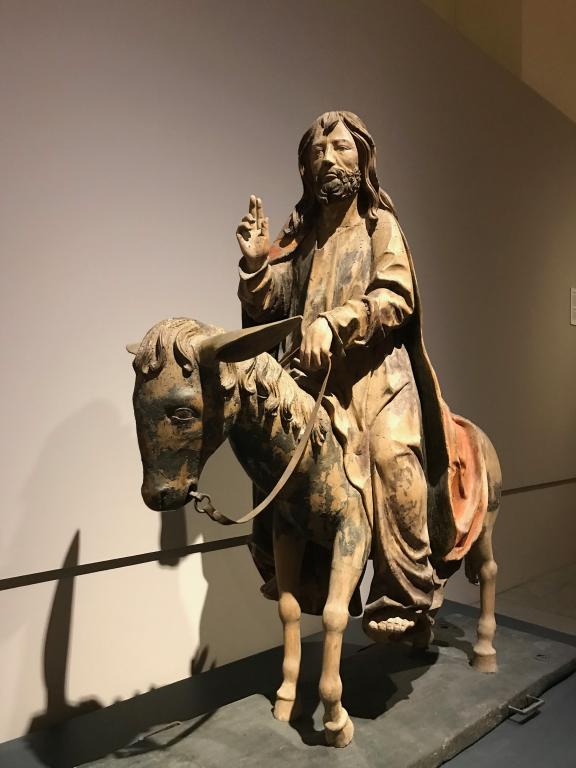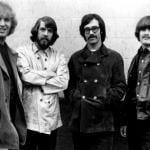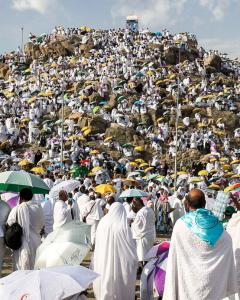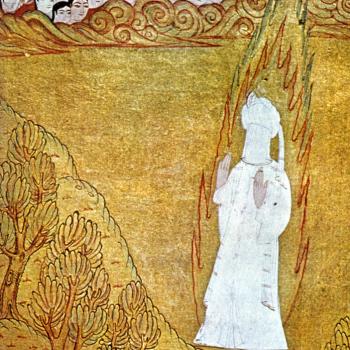
On a recent trip to Berlin, I visited the Bode Museum with a friend. We went through rooms and rooms of medieval art, admiring the paintings of star-haloed madonnas and watchful saints, until we came to a hall of reliquaries. And there I stopped short. Seeing a sculpture of Jesus riding a donkey, I heard Mevlana’s verses in my mind:
Have pity on Jesus, but not on the donkey:
don’t allow your animal nature to rule your reason.
Let it weep bitterly; take from it
what you need to pay your debt.
For years you have been the donkey’s slave. Enough!
…
In Jesus reason was strong, and the donkey was weak.
The donkey is made lean by a strong rider.
But often from the weakness of reason,
this worn-out ass has become a dragon.
[Mathnawi: II, 1853-5 and 1859-60; translated by R.A. Nicholson]
This passage comes from the second book of the Masnavi, whose theme is the remorseful self which has started to awaken from the sleep of living life at the lowest level: eating and sleeping, seeking pleasure and avoiding pain.
Without the intervention of consciousness—what Mevlana calls reason—the nafs (ego) can go from braying donkey to roaring monster. Weakness of spiritual faculties strengthens the spell of embodiment, leading us to believe that we are only our fleshly selves and that the material dimension of the Seen is the only reality.
Standing there at the museum, I felt grateful to be reminded of all of these things, and to be on a path where we are encouraged to develop the capacity of our Jesus not at the expense of our donkey but to its benefit. Mevlana says, “The donkey is made lean by a strong rider.” Sheikh Kabir often reminds us that we are not trying to kill the ego, but only train it to become a helpful servant.
The human being is understood to be the macrocosm of the Universe in our tradition, whose body shares in the sacredness and perfection of the rest of creation. Just as the mosque resembles the human faculty of worship, with a dome for a head, windows for eyes and minarets for ears, the body is our road of pilgrimage.
Some Sufi orders focus on cultivating the body’s subtle capacities as part of spiritual development, while we in the Mevlevi order have the sema ceremony to find a way into higher dimensions through the body’s movement in space. Revolving around an empty center, we come into alignment with every atom in the universe that is whirling around the Heart of Being, and thus arrive at the Kaaba of our own heart.
Mevlana picks up this theme in the sixth book of the Masnavi, whose theme is the self which has gone through all the struggles of false sovereignty and is on its way to finding contentment in true servanthood. He says:
O body that has become the spirit’s dwelling place,
enough is enough:
how long can the Sea abide in a water-skin?
O you who are a thousand Gabriels
in the form of a human being,
O you who are many messiahs inside Jesus’ donkey,
O you who are a thousand Kaabas
concealed in a house of prayer,
O you who cause ‘ifrit and devil to fall into error,
you are the spaceless object of worship in space;
you destroy the devil’s business,
for they say, “How should I pay homage to this clay?
How should I bestow on a mere form
a title signifying obedience?”
This human being is not form: rub your eye well,
so that you may behold in him
the radiance of the light of God’s glory!
Mathnawi: VI, 4583-4588, translated by R.A. Nicholson
If we could really see (“rub your eye well”) we would see that the Beloved is in love with us. And if we knew that, we wouldn’t give our attention to any lessor suitors, whether in body or in spirit.
As well as the injunction to wake up from the sleep of unconscious embodiment, in this passage I hear an invitation: to sharpen our spiritual perception to see the Light behind all forms and especially to see the Divine intelligence shining out of the human being. To remember, or zhikrallah as a verb, is to know yourself and know your Lord (Rabb, Sustainer).
The opportunity on our path is to first go beyond the conventional construction of being a good person who follows the rules and does the right things, then to transcend the identity of being a spiritual person who understands the inner meaning of the external prayers and rituals, to finally become bewildered in Love.
The great Sufi philosopher Ibn Arabi wrote: “In the end I saw my journey was entirely in myself – and when I came to the presence of my Lord I saw that I was only servanthood, without a trace of sovereignty.”












